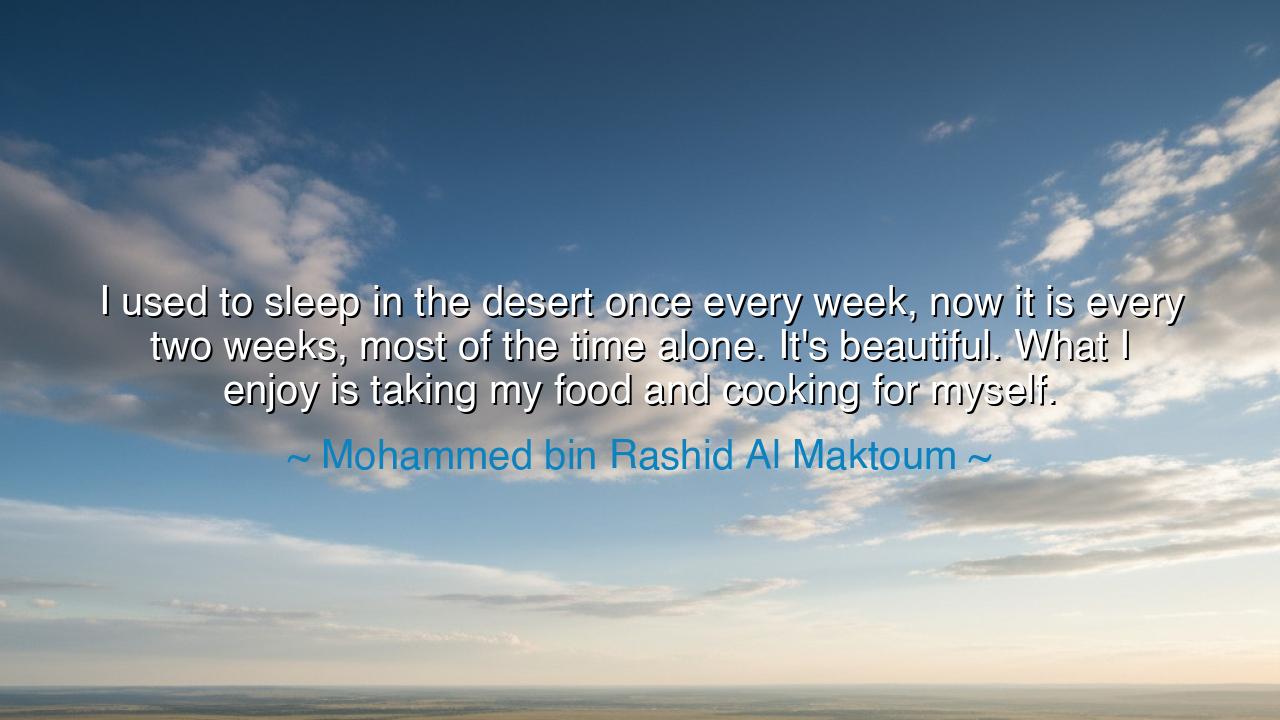
I used to sleep in the desert once every week, now it is every
I used to sleep in the desert once every week, now it is every two weeks, most of the time alone. It's beautiful. What I enjoy is taking my food and cooking for myself.






“I used to sleep in the desert once every week, now it is every two weeks, most of the time alone. It’s beautiful. What I enjoy is taking my food and cooking for myself.” — Thus speaks Mohammed bin Rashid Al Maktoum, ruler, poet, and visionary of the sands. In these few words lies not only the simplicity of a personal habit, but the distilled wisdom of the ages: that true greatness does not dwell in palaces or power, but in communion with the earth, the self, and the silence that precedes all creation. When a man of immense authority returns to the desert, to solitude, to the humble act of preparing his own food, he reveals a truth older than kingship itself — that all strength begins in simplicity, and all clarity is born from stillness.
The origin of these words lies in the heart of the Arabian sands — that vast and merciless expanse where life itself is a teacher. For centuries, the desert has been a forge for the spirit. It strips away illusion, humbles pride, and leaves a man face to face with his own soul. Sheikh Mohammed, born of Bedouin heritage and shaped by the call of the dunes, speaks here not merely as a leader, but as one who remembers where he came from. His retreat into the desert is not an escape, but a return — a renewal of the ancient bond between man and the elements. In the emptiness of the desert, one finds presence; in solitude, one discovers connection.
There is beauty in the silence of the desert — a beauty that only those who have known noise and conquest can truly appreciate. When the winds whisper across the dunes and the stars blaze above like eternal lamps, the soul becomes still enough to hear its own heartbeat. In that quiet, one learns what no court or city can teach: that contentment comes not from abundance, but from awareness. The act of cooking for oneself, of laboring for one’s own sustenance, becomes a sacred ritual — a reminder that even rulers are sustained by the same fire, the same hunger, the same humble bread as all men. It is a lesson of humility wrapped in simplicity, as old as humanity itself.
So too did the ancients seek the wilderness for truth. Moses ascended Sinai not as a prince, but as a wanderer. Muhammad, peace be upon him, retreated to the cave of Hira to meditate upon the mysteries of the divine. Even Marcus Aurelius, emperor of Rome, found solace not in luxury but in meditation upon the nature of life and duty. They all knew what Sheikh Mohammed knows — that solitude is not loneliness, but communion with the eternal. Those who wish to lead must first learn to be alone; those who wish to command others must first master themselves.
The modern world, intoxicated by speed and abundance, forgets this truth. We measure worth by possessions, and strength by noise. But the desert teaches the opposite: that power lies in restraint, and joy in simplicity. To sleep beneath the open sky, to feel the wind upon one’s face, to cook one’s own food — these are not signs of poverty, but of freedom. The man who can delight in such small things is richer than the one who owns cities yet cannot find peace. The desert strips life down to its essentials, and in doing so, reveals the essence of man.
In Sheikh Mohammed’s practice there is both wisdom and warning. As his visits grow less frequent — from every week to every two — we see the quiet truth that as the world grows louder, solitude becomes harder to find. Yet he still returns, as all wise men do, to drink from that ancient well of silence. It is there, in the emptiness, that he renews his clarity and remembers who he is beyond the titles and crowns. To rule well, one must remember the feel of sand beneath one’s feet, the taste of one’s own labor, the humility of being just a man before the vastness of creation.
Therefore, let this be the lesson: seek moments of solitude, however brief. Leave behind the noise of the world, and return to the quiet spaces where your soul can breathe. Go into nature, into silence, into simplicity. Cook your own food, tend your own fire, sleep beneath the open sky if you can. Do not fear being alone, for it is in solitude that you become whole. The desert within you awaits — vast, beautiful, eternal. Enter it with reverence, and there you will find not emptiness, but peace, not silence, but the voice of your truest self.






AAdministratorAdministrator
Welcome, honored guests. Please leave a comment, we will respond soon